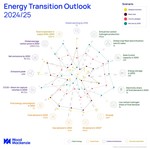News Release from Wood Mackenzie Ltd
Wind Industry Profile of
Can the US rise to meet the net-zero emissions challenge?
US President Joe Biden has a transformational goal: he wants the country to achieve net-zero emissions by 2050, building on the net-zero power sector he wants in place by 2035. Can the US meet this challenge?
According to new research released today by global natural resources consultancy Wood Mackenzie, a Verisk business (Nasdaq: VRSK), the US is likely to struggle to achieve Biden’s ambitions. Technological limitations, policy design, market structures and even the United States’ political and constitutional foundations may hamper progress.
“Despite this, efforts to meet these goals will bring about major change in the US market that will help lower global carbon emissions,” said David Brown, head of Markets and Transitions at Wood Mackenzie.
The Biden administration’s goals are broadly aligned with measures to set the world on course to limit global warming to an ambitious 1.5?°C.
Brown said: “Achieving this will take tremendous effort. All sectors of the energy industry will have to be transformed. For example, wind and solar power would have to become the largest sources of generation by 2035, alongside massive expansion in carbon capture and zero-carbon hydrogen.”
Electrification and energy efficiency are critical. Huge gains can be made from improving energy performance in buildings, industrial processes and cities.
Speeding up electric vehicle adoption will also be vital. Last month, President Biden signed an executive order setting a goal that 50% of all new passenger cars and light trucks sold in the US by 2030 be zero emissions.
Ram Chandrasekaran, head of Road Transport, said: “Our net-zero scenario for the US transport sector suggests annual EV sales through the end of the decade would need to be around 50% higher than in our base case, which shows a zero-emissions market share of only 27% in 2030.”
The level of EV sales needed to achieve a net zero pathway will pose a challenge for power markets too. New EV buyers would, on average, see a 20-30% increase in their household power consumption.
“Should EV sales accelerate beyond our base case, transmission providers and utilities would need to sharpen their focus on managed charging, reliability and grid resilience to handle the surge in power demand,” Chandrasekaran said.
Brian McIntosh, director, North America Power Service, agreed.
“Achieving a net zero US power sector by 2035 will be extremely challenging. Based on our understanding of technologies, market policies, the challenges of quickly building transmission lines and the electrification of energy, we believe that 66% clean generation by 2035 is more feasible,” he said.
“Proposed policies and financial incentives, combined with the cost competitiveness of renewable technologies, makes adding wind and solar relatively inexpensive.?However, solutions that maintain reliability and resilience are both expensive and full of unknowns.
“A multi-day storage solution is needed in a net zero world, but we think we can expect no more than 10 to -15-hour durations from battery storage by 2035.
“The remaining gas-fired power plants will need to be fitted with carbon capture and storage, but the technology’s ability to deal with large-scale carbon emissions in the power sector needs to be proven,” McIntosh said.
Brown added: “Even in a net-zero economy, not all hydrocarbons will be removed from the US energy system. They will be needed to back up renewables in the power market, for example.
“Emissions from fossil-fuel combustion will have to be captured. In our net zero scenario, the US needs to reach 1 billion tonnes per annum of storage by 2050, up from 25?million tpa today.”
Hydrogen markets need to be expanded, and carbon capture, utilisation and storage needs to be developed, at scale, and quickly.
This will require significant expenditure, both from the public and private sectors, as well as government incentives to spur investment.
Brown said: “Proposals for climate-related spending in the US today fall far short of the US$10 trillion we think will be required between 2021 and 2050 to achieve the administrations emissions goals.”
Brown said the priority areas for investment to put the US on a net-zero pathway include:
- cross-state infrastructure for high-voltage power transmission;
- a carbon abatement-cost fund to support carbon removal capacity, such as CCUS, DAC and low-carbon hydrogen;
- energy storage technologies for both long-duration solutions in the power sector and for distributed, behind-the-meter, demand-side management.
Making the changes required to put the economy on a path to net zero is particularly challenging in the US because of its system of government. The separation of powers and federal system put constraints on executive authority, and President Biden’s ability to make progress towards his climate objectives will be more limited than for his counterparts in many other countries.
He can use executive actions and regulations to try to drive down emissions, but those will face legal challenges and could be reversed by future administrations.
The US is likely to fall short of President Biden’s lofty aspirations. But by setting those goals, he has brought the US back to the negotiating table with a chance to influence global climate policy.
- Source:
- Wood Mackenzie
- Author:
- Press Office
- Link:
- www.woodmac.com/...
- Keywords:
- Wood Mackenzie, USA, Joe Biden, President, emissions, America, hurdles, CO2, repower, renewable energy, goal, challenge, policy, carbon emissions






















